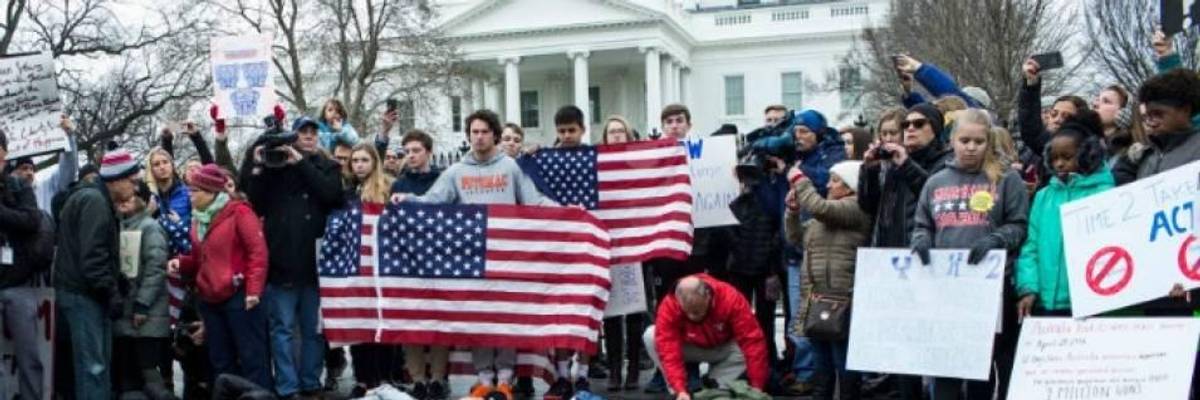Let's open the classroom doors -- all of them. Open up the schools, open up America, looking for the lost souls.
"Woo hoo!" he shouted as he fired off his guns. By the time he was done, ten more people were dead. Eight students, two teachers.
More sacred lives tossed to the God of War.
The murders at Santa Fe High School, in Santa Fe, Texas, on May 18 were "the fourth-deadliest mass shooting at a U.S. public school in modern history," according to Reuters, as though such stats help us grasp what happened, and why. Perhaps in a way they accomplish the opposite -- converting the deaths to numbers, filing them away in the national memory as the news cycle moves on.
But we all know the next horror headline is waiting to be written.
". . . while shootings at schools are terrible, it's not the schools that are the problem. The real problem is that America as a whole is dangerous," writes Mike Males at Yes! Magazine, making the point that American schools, overall, are far safer than most of the rest of American society, where thousands of gun homicides occur annually. The problem faced by American schools, in other words, is that they'relocated here, in the land of the free and the home of the armed, where 300 million firearms are at the ready; and thus they are vulnerable to occasional invasions by armed America.
The problem here is unimaginably large. The more gun homicides the country endures, the more people feel the need to be armed in order to protect themselves, which simply -- paradoxically -- feeds the problem. The more guns out there, the more dangerous the world is. It's the sheer presence of firearms that creates the likelihood that they will be used, just as national preparation for war makes the next war virtually inevitable.
As Males points out, arming 20 percent of the teachers -- the insane "solution" Donald Trump and the NRA have tossed into the vortex -- "would mean 800,000 more armed adults in schools," intensifying the danger of going to school beyond what anyone dare imagine.
But the other side of the American "debate" about guns and violence seems achingly ineffectual. Tougher gun laws -- background checks with teeth -- may be necessary, but take control over such a miniscule part of the problem. Legal and bureaucratic fixes will not, by themselves, rescue, let alone transform, a violent culture.
The 17-year-old Santa Fe High School shooter's weapons were legal, for God's sake. Dimitrios Pagourtzis murdered classmates and teachers with his father's legally owned shotgun and revolver. Does that lessen the seriousness of what he did?
The issue here goes well beyond the law. Is this not a matter of what constitutes empowerment? The addictive popularity of guns is not due to their pragmatic usefulness. It's due to the sense of power they bestow: being fully human, fully alive.
No matter, as Brad J. Bushman pointed out some years ago in Psychology Today, that "the costs of gun ownership far outweigh the benefits." The gun you own is, he writes, "much more likely to be used to kill you (suicide) or someone you love (accident, homicide in a heated argument) than a stranger in self-defense. The costs of living in a society of gun owners also means a substantially higher rate of homicides, suicides, and accidents."
And, oh yeah, mass murders.
And the boy in the trench coat opens fire in art class. He's described (like all those who preceded him) as a "quiet loner." His father said he was bullied and disrespected at school.
And USA Today tells us: "As the horror unfolded, Pagourtzis roamed from classroom to classroom, taunting students and blasting away as they made ill-fated efforts to elude or hide from his barrage of gunfire."
Please, let this be the moment at which we pause, as a lost kid -- deeply, spiritually lost -- uses guns and bullets to find a half an hour of respect, then surrenders. What's missing in this scenario is an alternative.
Empowerment is about more than being able to protect yourself. It's about fully being yourself, connected to your community: valued by it, indispensable to it. This is not a priority or focus of our educational system, which mostly separates its students from one another and measures their worth in separation. This means there will always be losers. And sometimes -- as the headlines tell us every couple of months -- the losers push back.
The most encouraging alternative I've seen to this situation is the movement, taking hold in some of our country's most troubled schools, called Restorative Justice, which begins by giving every student his or her voice.
Several years ago I wrote a column about City Springs School, a K-8 school in Baltimore, which has transformed itself by moving beyond zero tolerance and punishment-based discipline, replacing this failed educational status quo with peace circles, in which all participants -- adults and children -- sit together in vibrant equality.
"I spent half a day at City Springs recently, as part of my own determination to see how people are creating peace on our planet," I wrote. "I sat in 'proactive circles' with first-graders and eighth-graders, listening and participating as the kids checked in and talked about how they were doing that day. One teacher said the proactive circle, held not in response to a problem but simply to get the day started, was like taking a daily vitamin. Kids and adults connect with each other and a context of respect and mutual cooperation is established anew."
I'm talking here not about quick fixes but long-term transformation -- the emergence of schools that don't separate education from empowerment. What happens to kids who grow up feeling valued?




